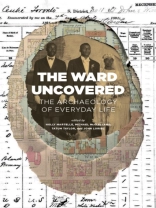An archaeological dig uncovers the secret history of Toronto’s long-forgotten first immigrant neighbourhood.
In early 2015, a team of archaeologists began digging test trenches on a non-descript parking lot next to Toronto City Hall – a site designated to become a major new court house. What they discovered was the rich buried history of an enclave that was part of The Ward – that dense, poor, but vibrant ‘arrival city’ that took shape between the 1840s and the 1950s. Home to waves of immigrants and refugees – Irish, African-Americans, Italians, eastern European Jews, and Chinese – The Ward was stigmatized for decades by Toronto’s politicians and residents, and eventually razed to make way for New City Hall. The archaeologists who excavated the lot, led by co-editor Holly Martelle, discovered almost half a million artifacts – a spectacular collection of household items, tools, toys, shoes, musical instruments, bottles, industrial objects, food scraps, luxury items, and even a pre-contact Indigenous projectile point. Martelle’s team also unearthed the foundations of a nineteenth-century Black church, a Russian synagogue, early-twentieth-century factories, cisterns, privies, wooden drains, and even row houses built by formerly enslaved African Americans.
Following on the heels of the immensely popular The Ward: The Life and Loss of Toronto’s First Immigrant Neighbourhood, which told the stories of some of the people who lived there, The Ward Uncovered digs up the tales of things, using these well-preserved artifacts to tell a different set of stories about life in this long-forgotten and much-maligned neighbourhood.
Despre autor
Tatum Taylor is a writer and heritage specialist at ERA Architects. She holds a master’s degree in historic preservation from Columbia University, where she worked on the editorial team for the Future Anterior Journal. She lives in Toronto.












